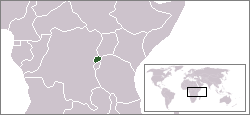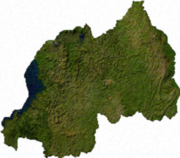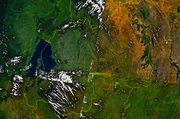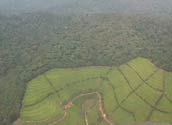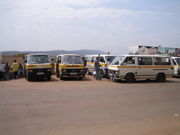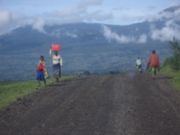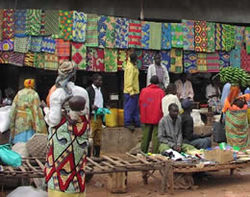Rwanda
2007 Schools Wikipedia Selection. Related subjects: African Countries; Countries
| Repubulika y'u Rwanda République Rwandaise Republic of Rwanda |
|||||
|
|||||
| Motto: Ubumwe, Umurimo, Gukunda Igihugu "Unity, Work, Patriotism" |
|||||
| Anthem: Rwanda nziza | |||||
| Capital (and largest city) |
Kigali |
||||
| Official languages | French, English, Kinyarwanda | ||||
|---|---|---|---|---|---|
| Government | Republic | ||||
| - President | Paul Kagame | ||||
| - Prime Minister | Bernard Makuza | ||||
| Independence | from Belgium | ||||
| - Date | July 1, 1962 | ||||
| Area | |||||
| - Total | 26,338 km² ( 148th) 10,169 sq mi |
||||
| - Water (%) | 5.3 | ||||
| Population | |||||
| - July 2005 estimate | 9,038,0001 ( 86th) | ||||
| - 2002 census | 8,128,553 | ||||
| - Density | 320/km² ( 27th) 829/sq mi |
||||
| GDP ( PPP) | 2005 estimate | ||||
| - Total | $11.24 billion ( 130th) | ||||
| - Per capita | $1,300 ( 160th) | ||||
| HDI (2003) | 0.450 (low) ( 158th) | ||||
| Currency | Rwandan franc ( RWF) |
||||
| Time zone | CAT ( UTC+2) | ||||
| - Summer ( DST) | not observed ( UTC+2) | ||||
| Internet TLD | .rw | ||||
| Calling code | +250 | ||||
| 1 Estimates for this country explicitly take into account the effects of excess mortality due to AIDS; this can result in lower life expectancy, higher infant mortality and death rates, lower population and growth rates, and changes in the distribution of population by age and sex than would otherwise be expected. | |||||
Rwanda IPA: [ɾ(g)wɑndɑ], officially the Republic of Rwanda, is a small landlocked country in the Great Lakes region of east-central Africa, with a population of approximately 8 million. It is bordered by Uganda, Burundi, the Democratic Republic of the Congo and Tanzania. Its fertile and hilly terrain, which gives it the title "Land of a Thousand Hills" (French: Pays des Mille Collines /pei de mil kɔ.lin/) (Igihugu cy'Imisozi Igihumbi in Kinyarwanda), supports the densest populations in continental Africa. It is best known to the outside world for the 1994 Rwandan genocide that resulted in the deaths of up to one million people. Dependence on subsistence agriculture, high (and increasing) population density, decreasing soil fertility and uncertain climate make Rwanda a country where chronic malnutrition is widespread and poverty endemic.
History
As early as the 15th century there were three groups of people, the Hutu, the Tutsi, and the Twa living in Rwanda. The Tutsi, from further north, conquered the area, and became the ruling power, and forced the Hutu into a feudal type system that was strictly enforced. The Twa, the smallest minority group, were court jesters and often exploited. John Speke became the first European to visit Rwanda, and in 1895 the Rwandans accepted German rule to become part of German East Africa. The Germans, however, were at first completely dependent on the existing government; they did nothing to develop the country economically. The German authority kept the indigenous administration system by applying the same type of indirect rule established by the British Empire in the Ugandan kingdoms.
After Germany's loss in World War I, the protectorate was taken over by Belgium with a League of Nations mandate. Belgian rule in the region was far more direct and harsh than that of the Germans. However, the Belgian colonizers did realize the value of native rule. Backed by Christian churches, the Belgians used the minority Tutsi upper class over lower classes of Tutsis and Hutus. Belgian-forced labor policies and stringent taxes were mainly enforced by the Tutsi upper class, whom the Belgians used as buffers against people's anger, thus further polarising the Hutu and the Tutsi. Many young peasants, in order to escape tax harassment and hunger, migrated to neighboring countries. They moved mainly to Congo but also to Ugandan plantations, looking for work.
After World War II Rwanda became a UN trust territory with Belgium as the administrative authority. In 1959, King Mutara III Charles was assassinated and his younger brother became the Abega clan monarch, King Kigeli V. In 1961, King Kigeli V was in Kinshasa to meet with Secretary-General of the United Nations Dag Hammarskjold when Dominique Mbonyumutwa, with the support of the Belgian government, led a coup d'état. The coup resulted in the overthrow of King Kigeli V to Uganda – the Hutu gained more and more power. Upon Rwanda's independence on July 1, 1962, they virtually held it all.
Gregoire Kayibanda was the first president (1962 - 1973), followed by Juvenal Habyarimana (1973 - 1994). The latter, who many view as a ruthless dictator, was unable to find a solution to increasing social unrest, the calls for democracy and the long-running problem of Rwandan Tutsi refugees. Rwanda had by the 90s up to one million refugees scattered around neighbouring countries, the majority of them in Uganda and Burundi.
In 1990, the Tutsi-dominated Rwandan Patriotic Front (RPF) invaded Rwanda from Uganda. During the course of the fighting, top Rwandan government officials, mainly Hutu, began secretly training young men into informal armed bands called Interahamwe ("coming together"). Government officials also launched a radio station that began anti-Tutsi propaganda. The military government of Juvénal Habyarimana responded to the RPF invasion with pogroms against Tutsis, whom it claimed were trying to re-enslave the Hutus. In August 1993 the government and the RPF signed a cease-fire agreement known as the Arusha accords in Arusha, Tanzania to form a power sharing government, but fighting between the two sides continued. The United Nations sent a peacekeeping force named the United Nations Assistance Mission for Rwanda ( UNAMIR), under the leadership of Canadian Lieutenant-General Roméo Dallaire. UNAMIR was vastly underfunded and under-staffed. More details of this aspect of the conflict are starkly explained in Dallaire's 2003 book Shake Hands With the Devil.
During the armed conflict, the RPF was blamed for the bombing of Kigali. These attacks were actually carried out by the Hutu army as part of a campaign to create a reason for a political crackdown and ethnic violence. On April 6, 1994, President Habyarimana was assassinated when his Falcon 50 trijet was shot down while landing in Kigali. It remains unclear who was responsible for the assassination — most credible sources point to the Presidential Guard, spurred by Hutu nationalists fearful of losing power, although others believe that Tutsi rebels were responsible, possibly with the help of Belgian mercenaries. Over the next three months, the military and Interahamwe militia groups killed between 500,000 and 1,000,000 Tutsis and Hutu moderates in the Rwandan Genocide. The RPF continued to advance on the capital, and occupied the northern, the east and the southern parts of the country by June. Thousands of civilians were killed in the conflict. U.N. member states refused to answer UNAMIR's requests for increased troops and money. Meanwhile, French troops were dispatched to stabilize the situation under Opération Turquoise, but this only resulted in an exacerbation of the situation, with the evacuation limited to foreign nationals.
On July 4, 1994, the war ended as the RPF entered the capital Kigali. In the resulting Great Lakes refugee crisis over 2 million Hutus fled the country after the war, fearing Tutsi retribution. Most have since returned, although some Hutus remained in the Democratic Republic of the Congo, including some militia members that became involved in the First Congo War and Second Congo War. In 1996, after repeated unsuccessful appeals to the UN and the international community to deal with the security threat posed by the remnants of the defeated genocidal forces on its eastern border, Rwanda invaded eastern Zaire in an effort to eliminate the Interahamwe groups operating there. This action, and the simultaneous one by Ugandan troops, contributed to the outbreak of the First Congo War and the eventual fall of longtime dictator Mobutu Sese Seko.
Rwanda today is struggling to heal and rebuild, and showing signs of rapid development, but some Rwandans continue to struggle with the legacy of genocide and war. In 2004, a ceremony was held in Kigali at the Gisozi Memorial (sponsored by the Aegis Trust and attended by many foreign dignitaries) to commemorate the tenth anniversary of the genocide, and the country observes a national day of mourning each year on April 7. Rwandan genocidal leaders are on trial at the International Criminal Tribunal for Rwanda, in the Rwandan National Court system, and, most recently, through the informal Gacaca village justice program. The current Rwandan government, led by Paul Kagame, has been praised by many for establishing security and promoting reconciliation and economic development, but is also criticised by some for being overly militant and opposed to dissent. The country now plays host to many international travelers and is regarded as a safe place for tourists.
With new independent radio stations, Rwanda is finally attempting a free press, but some wonder how free the media really is with journalists disappearing and being apprehended whenever articles question the government.
Politics
After its military victory in July 1994, the Rwandan Patriotic Front organized a coalition government based on the 1993 Arusha accords, and political declarations by the parties. The National Movement for Democracy and Development – Habyarimana's party that instigated and implemented the genocidal ideology – along with the CDR (another Hutu extremist party) were banned, with most of its leaders either arrested or in exile.
A new constitution was adopted by referendum and promulgated in 2003. The first post-war presidential and legislative elections were held in August and September 2003, respectively. The RPF-led government has continued to promote reconciliation and unity amongst all Rwandans as enshrined in the new constitution that forbids any political activity or discrimination based on race, ethnicity or religion.
By law, at least a third of the Parliament representation must be female. It is believed that women will not allow the mass killings of the past to be repeated. In a survey conducted recently Rwanda tops the survey on number of women in the Parliament with as much as 49 percent female representation.
Administrative divisions
Rwanda is divided into five provinces (intara) and subdivided into thirty districts (akarere). The provinces are:
- North Province
- East Province
- South Province
- West Province
- Kigali Province
Prior to 1 January 2006, Rwanda was composed of twelve provinces, but these were abolished in full and redrawn as part of a program of decentralization and reorganization.
Geography
This small country is located near the centre of Africa, a few degrees south of the Equator. It is separated from the Democratic Republic of the Congo by Lake Kivu and the Ruzizi River valley to the west; it is bounded on the north by Uganda, to the east by Tanzania, and to the south by Burundi. The capital, Kigali, is located in the centre of the country.
Rwanda's countryside is covered by grasslands and small farms extending over rolling hills, with areas of rugged mountains that extend southeast from a chain of volcanoes in the northwest. The divide between the Congo and Nile drainage systems extends from north to south through western Rwanda at an average elevation of almost 9,000 feet (2,740 m). On the western slopes of this ridgeline, the land slopes abruptly toward Lake Kivu and the Ruzizi River valley, and constitutes part of the Great Rift Valley. The eastern slopes are more moderate, with rolling hills extending across central uplands at gradually reducing altitudes, to the plains, swamps, and lakes of the eastern border region. Therefore the country is also fondly known as "Land of a Thousand Hills" (Pays des milles collines). Recently, a British led exploration announced that they had located the longest headstream of the River Nile in Nyungwe Forest .
Climate
Rwanda is a tropical country; its high elevation makes the climate temperate. In the mountains, frost and snow are possible. The average daily temperature near Lake Kivu, at an altitude of 4,800 feet (1,463 m) is 73° F (23° C). Rwanda is considered the lightning capital of the world, due to intense daily thunderstorms during the two rainy seasons (February–May and September–December). Annual rainfall averages 31 inches (830 mm) but is generally heavier in the western and northwestern mountains than in the eastern savannas.
Transport
The transport system in Rwanda centres primarily around the road network, with paved roads between the capital, Kigali and most other major cities and towns in the country. Rwanda is also linked by road with other countries in East Africa, via which the majority of the country's imports and exports are made. The country has an international airport at Kigali, serving one domestic and several international destinations, and also has limited water transport between the port cities on Lake Kivu. A large amount of investment in the transport infrastructure has been made by the government since the 1994 genocide, with aid from the European Union, China, Japan and others.
The principal form of public transport in the country is the share taxi, with express routes linking the major cities and local services serving most villages along the main roads of the country. Coach services are available to various destinations in neighbouring countries.
In 2006, Chinese proposed to fund a study for the building of a railway link from Bujumbura in Burundi to Kigali in Rwanda to Isaki in Tanzania. [railwaysafrica.com RA 2/2006]
Economy
Rwanda is a rural country with about 90% of the population engaged in (mainly subsistence) agriculture. It is landlocked with few natural resources and minimal industry. Primary exports are coffee and tea, with the addition in recent years of minerals (mainly Coltan, used in manufacture of electronic and communication devices such as mobile phones) and flowers. Tourism also is a growing sector, notably around ecotourism (Nyungwe Forest, Lake Kivu)and the world famous and unique mountain gorillas in the Virunga park. It has a low gross national product (GNP), and it has been identified as a Heavily Indebted Poor Country (HIPC). In 2005, its economic performance and governance achievements prompted International Funding Institutions to cancel nearly all its debts.
According to the World Food Programme, it is estimated that 60% of the population live below the poverty line and 10-12% of the population suffer from food insecurity every year.
Demographics
All Rwandans speak Kinyarwanda and share the same culture and religions. It is difficult to establish exactly what words like "Tutsi" and "Hutu" meant before the arrival of European colonists, because there was no written history. Europeans greatly changed the meanings of those terms. In the 21st century a number of Rwandans reject the idea of sub-races and simply identify themselves as "Rwandans".
Geographic locale
 |
 |
|||
Burundi • Central African Republic • Chad • Democratic Republic of the Congo • Rwanda
Sovereign states: Algeria • Angola • Benin • Botswana • Burkina Faso • Burundi • Cameroon • Cape Verde • Central African Republic • Chad • Democratic Republic of the Congo • Republic of the Congo • Comoros • Côte d'Ivoire • Djibouti • Egypt 1 • Equatorial Guinea • Eritrea • Ethiopia • France 2 • Gabon • The Gambia • Ghana • Guinea-Bissau • Guinea • Kenya • Lesotho • Liberia • Libya • Madagascar • Malawi • Mali • Mauritania • Mauritius • Morocco • Mozambique • Namibia • Niger • Nigeria • Portugal 2 • Rwanda • Senegal • Seychelles • Sierra Leone • Somalia • South Africa • Spain 2 • Sudan • Swaziland • São Tomé and Príncipe • Tanzania • Togo • Tunisia • Uganda • Yemen 3 • Zambia • Zimbabwe
Dependencies: British Indian Ocean Territory (UK) • French Southern Territories (France) • Mayotte (France) • Réunion (France) • Saint Helena 4 (UK)
Unrecognized countries: Somaliland • Western Sahara •
1 Partly in Asia. 2 Mostly in Europe. 3 Mostly in Asia. 4 Includes the dependencies of Ascension Island and Tristan da Cunha.
Algeria • Angola • Benin • Botswana • Burkina Faso • Burundi • Cameroon • Cape Verde • Central African Republic • Chad • Comoros • Democratic Republic of the Congo • Republic of the Congo • Côte d'Ivoire • Djibouti • Egypt • Eritrea • Ethiopia • Equatorial Guinea • Gabon • The Gambia • Ghana • Guinea • Guinea-Bissau • Kenya • Lesotho • Liberia • Libya • Madagascar • Malawi • Mali • Mauritania • Mauritius • Mozambique • Namibia • Niger • Nigeria • Rwanda • São Tomé and Príncipe • Senegal • Seychelles • Sierra Leone • Somalia • South Africa • Sudan • Swaziland • Tanzania • Togo • Tunisia • Uganda • Western Sahara (SADR) • Zambia • Zimbabwe
Observers: Armenia • Austria • Croatia • Czech Republic • Georgia • Hungary • Lithuania • Mozambique • Poland • Serbia • Slovakia • Slovenia • Ukraine
![]() The Gambia •
The Gambia • ![]() Guinea •
Guinea • ![]() Guinea-Bissau •
Guinea-Bissau • ![]() Mali •
Mali • ![]() Mauritania •
Mauritania • ![]() Senegal •
Senegal • ![]() Sierra Leone
Sierra Leone
Atlantic
![]() Benin •
Benin • ![]() Burkina Faso •
Burkina Faso • ![]() Cameroon •
Cameroon • ![]() Central African Republic •
Central African Republic • ![]() Chad •
Chad • ![]() Côte d'Ivoire •
Côte d'Ivoire • ![]() The Gambia •
The Gambia • ![]() Guinea •
Guinea • ![]() Guinea-Bissau •
Guinea-Bissau • ![]() Liberia •
Liberia • ![]() Mali •
Mali • ![]() Mauritania •
Mauritania • ![]() Niger •
Niger • ![]() Senegal •
Senegal • ![]() Sierra Leone •
Sierra Leone • ![]() Sudan •
Sudan • ![]() Togo
Togo
Senufo: ![]() Benin •
Benin • ![]() Côte d'Ivoire •
Côte d'Ivoire • ![]() Mali
Mali
Gur: ![]() Benin •
Benin • ![]() Burkina Faso •
Burkina Faso • ![]() Côte d'Ivoire •
Côte d'Ivoire • ![]() Ghana •
Ghana • ![]() Mali •
Mali • ![]() Nigeria •
Nigeria • ![]() Togo
Togo
Adamawa-Ubangi: ![]() Cameroon •
Cameroon • ![]() Central African Republic •
Central African Republic • ![]() Chad •
Chad • ![]() Nigeria
Nigeria
Kru: ![]() Burkina Faso •
Burkina Faso • ![]() Côte d'Ivoire •
Côte d'Ivoire • ![]() Liberia
Liberia
Kwa: ![]() Benin •
Benin • ![]() Côte d'Ivoire •
Côte d'Ivoire • ![]() Ghana •
Ghana • ![]() Nigeria •
Nigeria • ![]() Togo
Togo
Bantu
![]() Angola •
Angola • ![]() Botswana •
Botswana • ![]() Burundi •
Burundi • ![]() Cameroon •
Cameroon • ![]() Democratic Republic of the Congo •
Democratic Republic of the Congo • ![]() Republic of the Congo •
Republic of the Congo • ![]() Equatorial Guinea •
Equatorial Guinea • ![]() Gabon •
Gabon • ![]() Kenya •
Kenya • ![]() Nigeria •
Nigeria • ![]() Malawi •
Malawi • ![]() Mozambique •
Mozambique • ![]() Namibia •
Namibia • ![]() Rwanda •
Rwanda • ![]() Somalia •
Somalia • ![]() South Africa •
South Africa • ![]() Swaziland •
Swaziland • ![]() Tanzania •
Tanzania • ![]() Uganda •
Uganda • ![]() Zambia •
Zambia • ![]() Zimbabwe
Zimbabwe
Yoruba and Igbo: ![]() Nigeria
Nigeria


